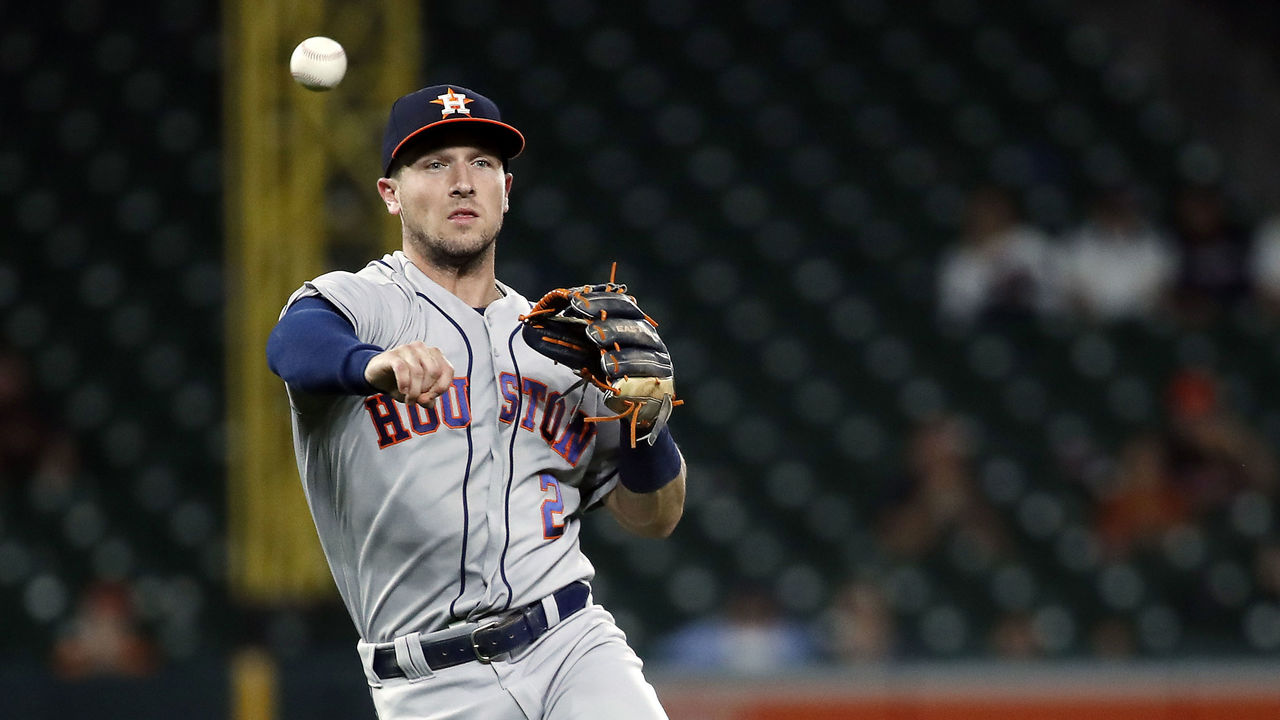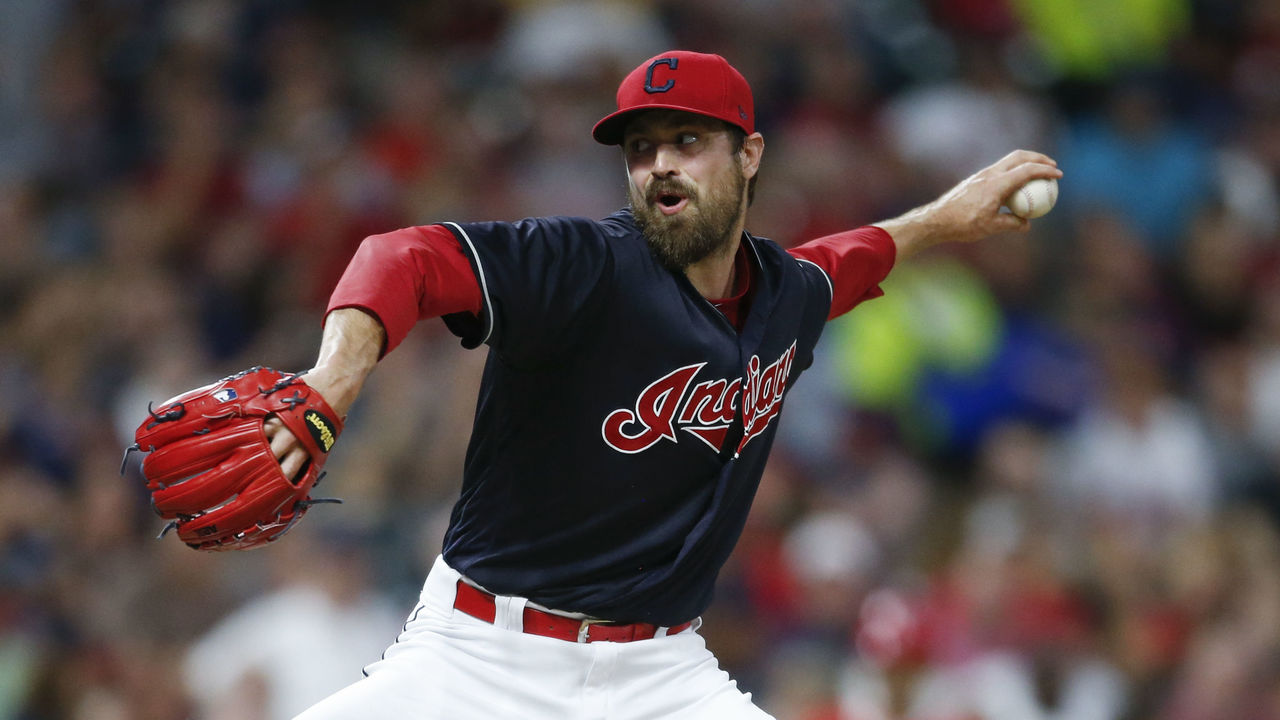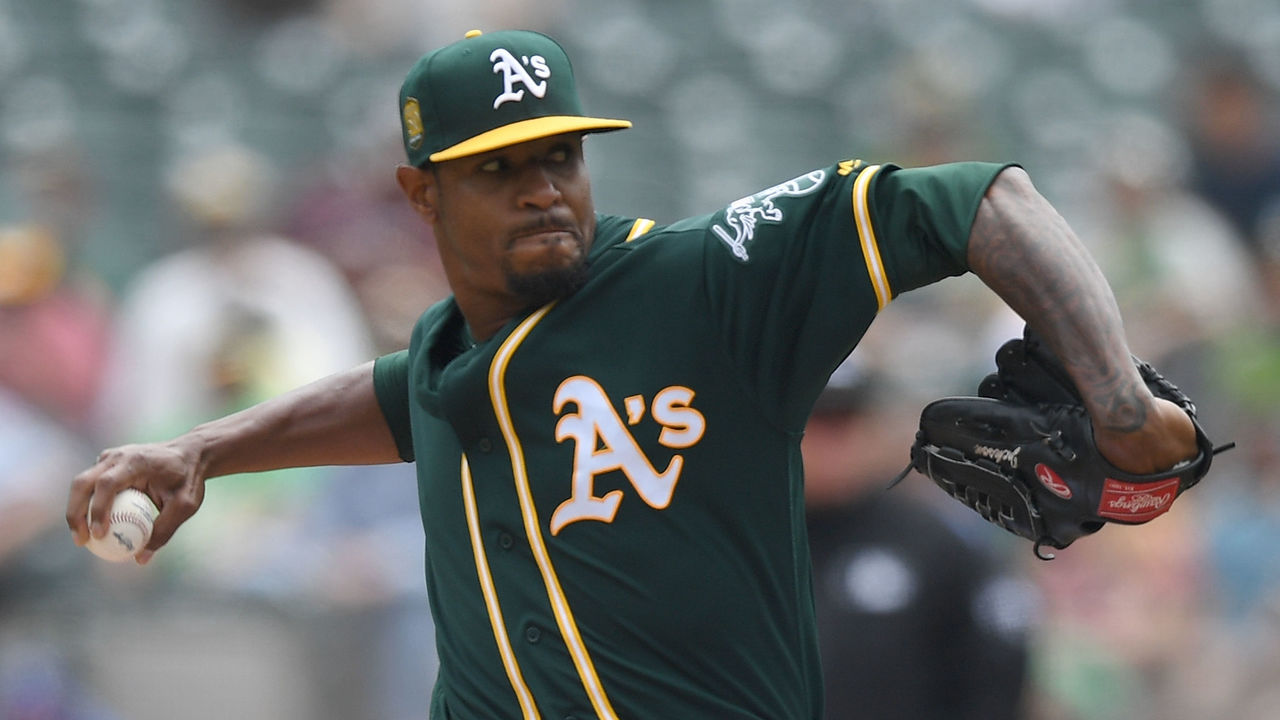Burning questions for each playoff team
The madness is over. Now, the real craziness starts.
On Tuesday, following a wild, protracted end to the regular season - resolution in both the National League Central and National League West required a Game 163 - the march to the World Series gets underway in earnest when the Chicago Cubs and Colorado Rockies do battle in the National League wild-card game.
With the postseason set to begin, let's take a look at one glaring question facing each playoff team.
National League
Milwaukee Brewers
| RECORD | RUN DIFFERENTIAL | RECORD VS. CHC/COL |
|---|---|---|
| 96-67 | +95 | 14-13 |
Who should be their primary catcher?
Erik Kratz did the bulk of the catching down the stretch for Milwaukee, displacing Manny Pina, who had received the lion's share of the playing time during the first half of the season. Kratz, who the Brewers landed in a late-May trade with the New York Yankees, started 10 of Milwaukee's final 15 contests, including Monday's win over the Cubs at Wrigley Field in Game 163. It seems the 38-year-old journeyman is the preferred option for manager Craig Counsell, which is a little strange given that Pina is either superior or at least as good as Kratz in almost every quantifiable area.

Pina is the better hitter, both this year and historically, and he's also better at throwing out potential base-stealers. Their blocking skills, according to Baseball Prospectus, are essentially equal. The only facet in which Kratz is demonstrably better than Pina is pitch-framing - and it's not like Pina is a bad framer. Of course, when it comes to evaluating catchers, intangibles play an outsized role, and Kratz's impossible-to-quantify strengths have likely compelled Counsell to give him the majority of the playing time of late. If a particular pitcher just feels better pitching to Kratz, what can Counsell do? But it still might behoove him to rethink the distribution of labor a little bit.
Los Angeles Dodgers
| RECORD | RUN DIFFERENTIAL | RECORD VS. ATL |
|---|---|---|
| 92-71 | +194 | 5-2 |
Can Clayton Kershaw exorcise his October demons?
"Maybe one of these days I won't fail, we won't fail and we'll win one of these things," Kershaw said following his club's loss in Game 7 of the 2017 World Series. A year later, the greatest pitcher of his generation - and the team he's carried for so long - has another shot at redemption.
For reasons that defy explanation, Kershaw's postseason woes - the lone blight on an otherwise immaculate Hall of Fame resume - have been as reliable as his success April through September. For his career, the three-time Cy Young award winner owns a 4.35 ERA in October, and only once since 2009 has he made it through an entire postseason without throwing up at least one stinker of a start. (In 2017, for instance, he got lit up in the NLDS opener and in Game 5 of the World Series.)

This year, like every other year, Kershaw will head into the playoffs on the heels of a terrific regular season - he authored a 2.73 ERA (143 ERA+) with a 5.34 strikeout-to-walk ratio - albeit one twice interrupted by DL stints. This year, like every other year, Kershaw's performance will be a deciding factor in whether the Dodgers snap their 29-year World Series drought. And this year, like every other year, Kershaw just needs to pitch better. There's no explicable reason he can't. He just hasn't.
Atlanta Braves
| RECORD | RUN DIFFERENTIAL | RECORD VS. LAD |
|---|---|---|
| 90-72 | +102 | 2-5 |
Who gets axed from the rotation?
As the Braves' first postseason series since 2013 looms, manager Brian Snitker will have a couple tough decisions to make, as two viable starters will have to be omitted from his National League Division Series rotation, which typically comprises only four starters. (The Braves' six-man rotation crafted a 3.33 ERA while holding opponents to a .194 average in September)
Of the two guys either relegated to relief or left off the roster entirely, one will almost definitely be rookie right-hander Touki Toussaint. The 22-year-old authored a 3.33 ERA while allowing just one home run in five starts with Atlanta after spending the bulk of the season in the minors, but was moved to the bullpen for the final week of the season - a move that likely presages his postseason role.

After Toussaint, though, there isn't an obvious candidate to get the boot. On pure ability, Julio Teheran might be the least deserving of a spot, but he's also the spiritual ace of the Braves' rotation. Sean Newcomb has struggled of late, but he's the Braves' lone left-handed starter. Anibal Sanchez has been outstanding all year, Kevin Gausman has killed it since coming over from Baltimore, and Mike Foltynewicz led the staff in WAR this season. Snitker may simply have to pick the most favorable matchups.
Chicago Cubs
| RECORD | RUN DIFFERENTIAL | RECORD VS. MIL |
|---|---|---|
| 95-68 | +116 | 11-9 |
Is their bullpen good enough?
The absences of Brandon Morrow and Pedro Strop loomed large in the Cubs' loss in Game 163, during which manager Joe Maddon went to his ostensible best reliever, Jesse Chavez, for two innings of middle relief, and was then left to (unsuccessfully) play matchups with less-than-ideal options later in the game. Complicating Maddon's decision-making, of course, was the increasing probability that the Cubs would have to play another game - to stay alive - the following day, but the four-reliever parade in the pivotal eighth inning against Milwaukee made it abundantly clear that the manager doesn't have many trustworthy late-inning options right now: Steve Cishek can't get lefties out, Carl Edwards Jr. struggles to pound the zone, Justin Wilson is a lefty specialist, and Brandon Kintzler should be relegated to a low-leverage role.

Strop's potential return will take some of the pressure off - the veteran right-hander has been on the disabled list since Sept. 13 but hopes to rejoin the Cubs if they make it to the NLDS - but the bullpen could be an issue throughout the postseason, regardless. Since losing Morrow to a bone bruise at the All-Star break, the Cubs' bullpen ranks in the bottom five in the National League in both strikeout rate (20.4 percent) and walk rate (10.4 percent), and it's kind of important in the postseason to A) miss bats; and B) not put guys on for free.
Colorado Rockies
| RECORD | RUN DIFFERENTIAL | RECORD VS. MIL |
|---|---|---|
| 91-72 | +35 | 2-5 |
Can they sustain their recent success at the plate?
For most of the season, the Rockies survived in spite of their offense, which eked out a miserable 84 wRC+ from Opening Day through to the end of August, tying them with the rebuilding San Diego Padres and Detroit Tigers for last in the majors over that span. For most of the season, outside of Nolan Arenado and Trevor Story, nobody hit.
In September, however, the Rockies scored more runs than every team except the Oakland A's and Dodgers while putting up a collective .828 OPS - which, after accounting for the offense-inflating effects of Coors Field, translates to a 105 wRC+, good for ninth-best in baseball. With their offense finally clicking, the Rockies went 19-9 down the stretch, putting up their best run differential (+59) of any month this season.

Was this merely a case of a small sample size? The Rockies' .320 BABIP in September - 15 points higher than their cumulative 2018 mark - suggests luck contributed to their offensive surge. But it also appears that substantive, if modest, changes in contact quality were a factor for the Rockies, who managed a .332 expected weighed on-base average over the final month of the season, representing a 13-point improvement over their mark through August. This bodes well heading into the postseason, assuming they survive the NL wild-card game.
American League
Boston Red Sox
| RECORD | RUN DIFFERENTIAL | RECORD VS. NYY/OAK |
|---|---|---|
| 108-54 | +229 | 12-13 |
What's the deal with Chris Sale?
Hampered by shoulder problems for much of the second half, Sale hasn't completed five innings in a start since Aug. 12, and the concern level skyrocketed last week amid a massive drop-off in his velocity. In his final regular-season tuneup, in which he allowed three runs in 4 2/3 innings Wednesday against the Baltimore Orioles, Sale's four-seamer sat at 90.2 mph, the lowest single-game average of his career. He topped out at 95. Back in June, Sale's average heater was coming in around 97-98 mph, and he could reach back for 101, when necessary.

Following Sale's outing against Baltimore, Red Sox manager Alex Cora insisted that the left-hander's shoulder is fine, blaming the velocity drop-off on faulty mechanics, but it's impossible not to be skeptical until Sale comes out pumping 96-97 in Game 1 of the American League Division Series. And while the Red Sox are ostensibly the best team in baseball - they led the majors and set a franchise record with 108 wins in 2018 - a compromised Sale could easily derail Boston's shot at a World Series considering how fraught the road to the AL pennant is.
Houston Astros
| RECORD | RUN DIFFERENTIAL | RECORD VS. CLE |
|---|---|---|
| 103-59 | +263 | 4-3 |
Can they handle the pressure?
Frankly, the Astros don't have any glaring defects or outstanding issues that need rectifying. On paper, they seem unbeatable.
Both Carlos Correa and George Springer struggled for most of the season and Josh Reddick regressed significantly, and Houston still fielded, after adjusting for park effects, the game's second-best offense. The Astros' fourth-best starter would probably be the best starter on the Cubs. Their bullpen led the majors in park-adjusted ERA and finished second in park-adjusted FIP. Defensively, they're more efficient than all but four teams. They're the reigning champs for a reason.

Being that good, however, can make a team vulnerable to complacency, which, in practical terms, could cause the Astros to underestimate an opponent, or might blur the sense of urgency inherent to a best-of-five (or best-of-seven) series. When you're that accustomed to winning - when victory is seen more as an inevitability than a legitimate pursuit - losses don't burn as badly, and then, bam, you're suddenly in an 0-2 hole, playing for your life. And, moreover, the Astros must also wrestle with lofty expectations. Heavy lies the crown, after all. If you don't find those arguments compelling, though, that's cool. The Astros are probably going to win the World Series again.
Cleveland Indians
| RECORD | RUN DIFFERENTIAL | RECORD VS. HOU |
|---|---|---|
| 91-71 | +170 | 3-4 |
Is their bullpen good enough (Part II)?
Heavy workloads over the last few seasons (and postseasons) have seemed to catch up with the Indians' most important relievers in 2018, as Cody Allen's effectiveness significantly waned and Andrew Miller was either hurt or unreliable through the regular season. The rest of Cleveland's bullpen didn't fare much better. Collectively, the club's 10 most-used relievers combined for just 1.2 WAR, and only two of them - lefty specialist Oliver Perez and trade-deadline godsend Brad Hand - fashioned a sub-4.00 ERA.

Yes, relief pitchers are notoriously volatile. And yes, Cleveland's cadre of ridiculously talented starters should, theoretically, take some of the pressure off the bullpen, particularly its middle relievers. But Indians manager Terry Francona has leaned heavily on his bullpen in each of the last two postseasons - Miller, if you recall, was named ALCS MVP in 2016 - and reliable relief pitching has been a pillar of this team's success. If those guys aren't delivering, Cleveland could be in trouble. It's not facing the Twins or Royals anymore.
New York Yankees
| RECORD | RUN DIFFERENTIAL | RECORD VS. BOS |
|---|---|---|
| 100-62 | +182 | 9-10 |
Will Greg Bird make the postseason roster?
Usurped at first base by Luke Voit, whom the Yankees acquired from St. Louis ahead of the non-waiver trade deadline, Greg Bird appeared in just seven games over the final month of the regular season, and started only twice after Sept. 12. His late-season erasure from the roster capped another miserable season for the oft-beleaguered Bird, who started the year on the disabled list, as usual, and never really got into a groove at the plate, hitting .199/.286/.386 with a 25.1 percent strikeout rate across a career-high 82 games. His increasingly sporadic playing time in September was also a likely portent of how the Yankees intend to use him in the playoffs, assuming they win the AL wild-card game, which is to say, not at all.

Bird's appeal as a bench bat is limited considering he was no better at the plate than, say, Neil Walker - another candidate for one of the Yankees' postseason bench jobs - who can also play multiple positions (including first base). As such, it's tough to see Bird figuring into New York's postseason plans.
Oakland Athletics
| RECORD | RUN DIFFERENTIAL | RECORD VS. BOS |
|---|---|---|
| 97-65 | +139 | 4-2 |
Will their pitching staff finally crack?
All season long, the Athletics' pitching staff defied expectations. Their starters - a motley crew of ostensible has-beens, unheralded youngsters, and Sean Manaea - outperformed either their reputations or peripheral stats, and their relievers almost always picked up the slack when called upon, logging the second-most innings of any relief corps and accumulating more win probability added than any other bullpen. Manager Bob Melvin, very much aware of his rotation's shortcoming, also made liberal use of the "opener" strategy first utilized by the Tampa Bay Rays, and it worked. Everything worked. Hence the 97 wins.

Having said all that, would you feel confident handing the ball to Edwin Jackson - the resurgent 35-year-old who crafted a 3.33 ERA over 17 starts this season - in a must-win game? Would you be comfortable giving Trevor Cahill a start at Fenway Park? Would you let Mike Fiers take on the Astros? Each of those propositions feels highly dubious, their regular-season success notwithstanding. A bullpen game still feels like a more attractive option to using any of those starters, especially in the AL wild-card game, but can that strategy be scaled for a four-week postseason run? Even if Melvin uses it as often as he can, eventually, the Athletics' starters are going to have to, you know, start. And though that somehow wasn't a problem during the regular season, weaknesses get exposed in October.
Jonah Birenbaum is theScore's senior MLB writer. He steams a good ham. You can find him on Twitter @birenball.
(Photos courtesy: Getty Images)
HEADLINES
- FAA investigating Rockies after 'unauthorized person' enters cockpit on flight
- Peralta to lead Brewers to win over Cardinals
- Booser arrives in majors with Red Sox after becoming carpenter in 2017
- Pirates' Chapman drops appeal, will serve 1-game suspension Friday
- Webb dominant for 7 innings as Giants blank D-Backs